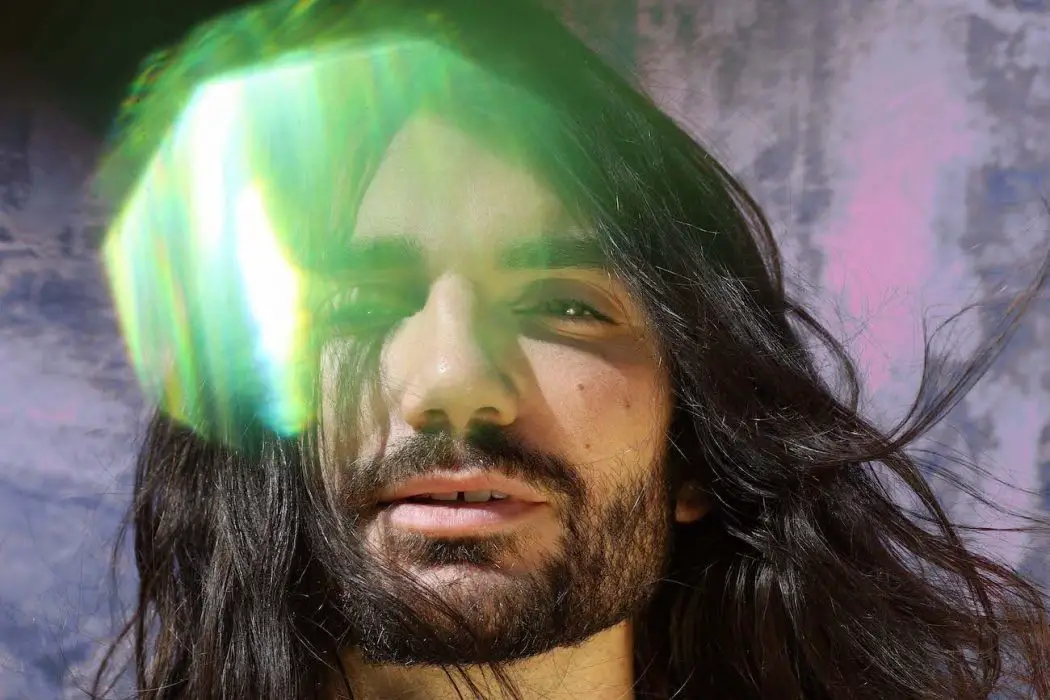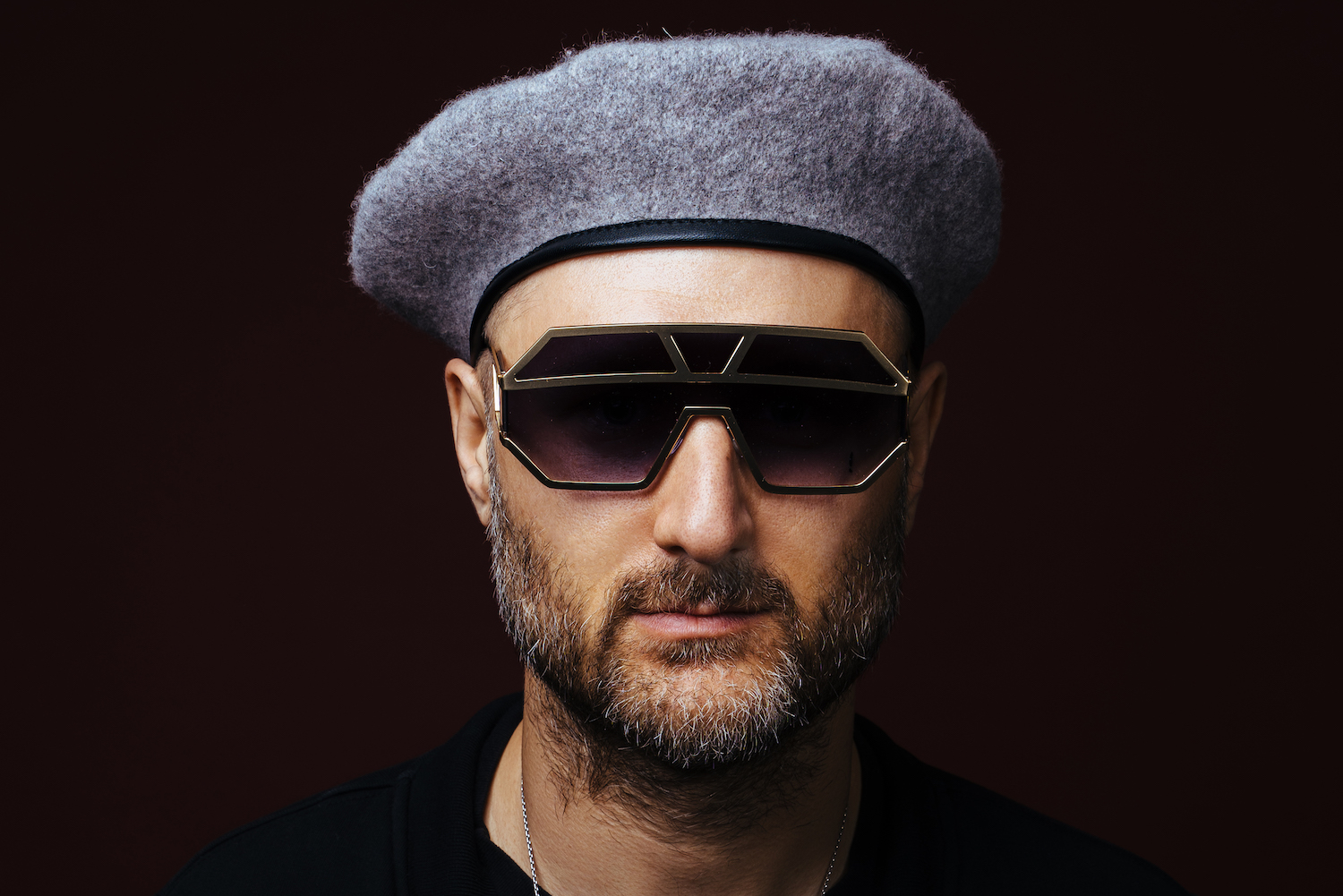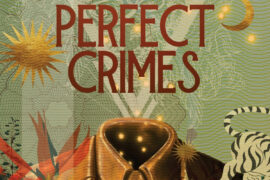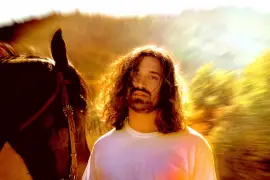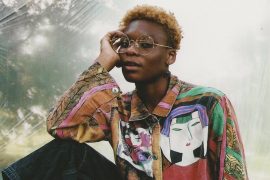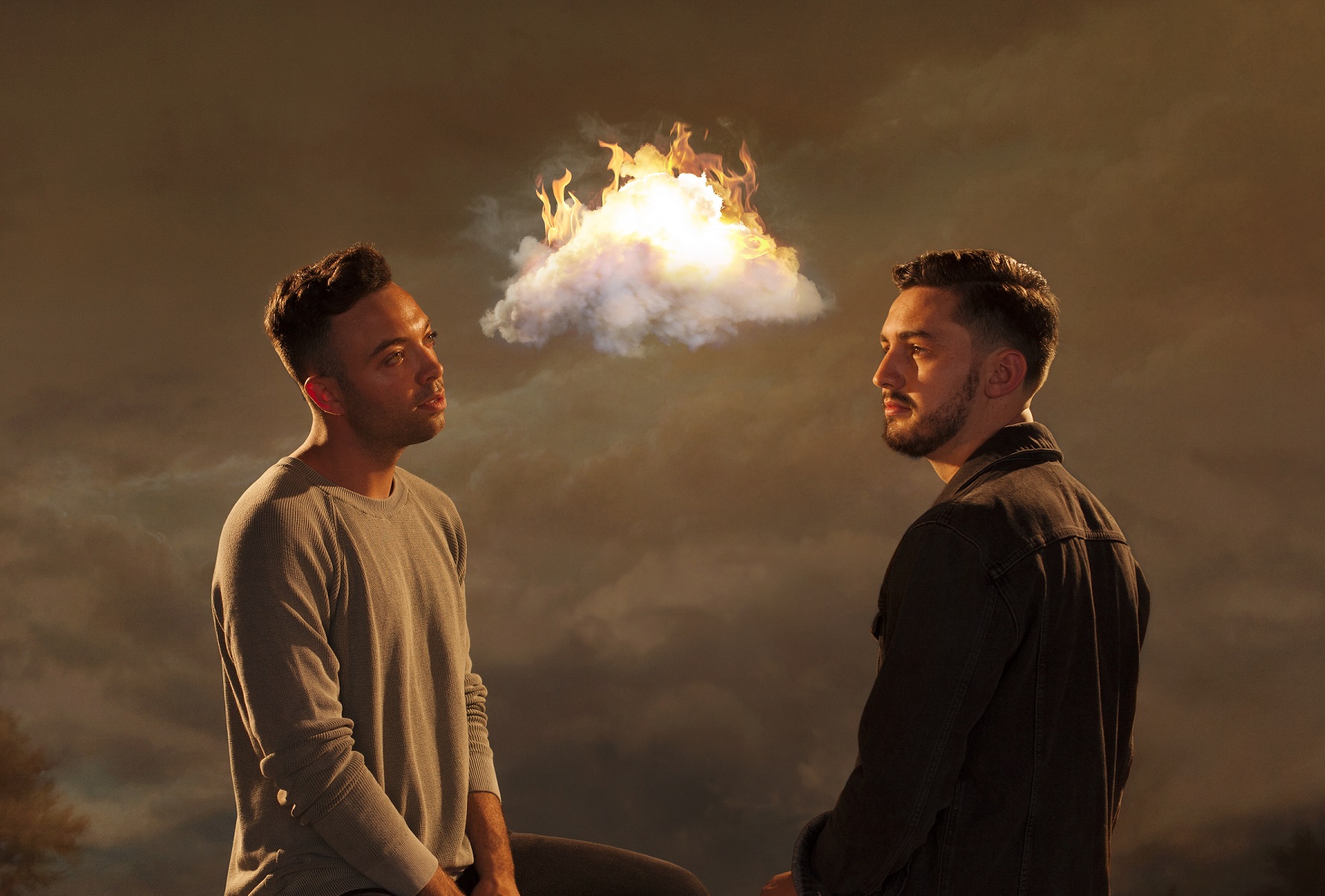Songwriter and producer Stephen explores the brightest and darkest expanse of life without limitation, and more, on his forthcoming sophomore LP ‘Akrasia’.
by guest writer Matthew Gose
Stream: “Delilah” – Stephen
Truly meaningful art guides us to a sense of peace while gently pushing us beyond our preconceived notions of comfort and normalcy. Artists take us to the outer bounds of our expectations and place us right on the brim where we can look over the canyon’s edge and experience something between earth and heaven. In those moments, we discover our truest selves. For artist and producer Stephen, the past two years have been filled with mountainous highs and unfathomable depths. While the road has certainly presented challenges, it has also produced in him a brighter, more grateful outlook as well as a revitalized creative energy.
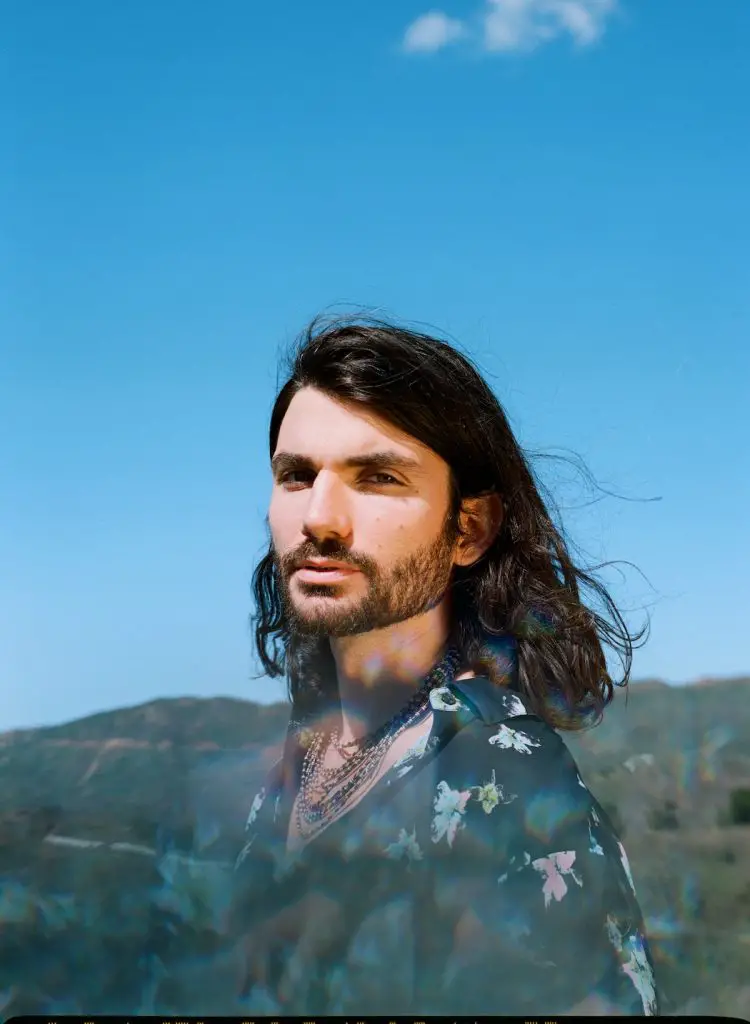
After releasing his debut album Sincerely in 2016, Stephen’s career was revving up. He played live shows and festivals. His intricate, genre bending sound garnered praise from both fans and critics. However, just as everything began to take flight, it all came to a dramatic halt when, in 2017, Stephen received a medical diagnosis for Lyme disease.
The sickness left him physically, emotionally, and creatively grounded. Recovery took nearly a year, requiring patience, focus, and most of all, rest. When the clouds finally parted, Stephen found himself infused with a new creative energy and a childlike hunger for adventure and discovery. After recovering, he took some time off in Thailand to escape the pressures of life in LA and to reconnect with himself in a new and exciting context. After his return, he began work on new material rooted in his fresh point of view. Now, he’s gearing up to release his sophomore album Akrasia, a process that began a few short months ago with the album’s lead single, “I Never Stay in Love.”
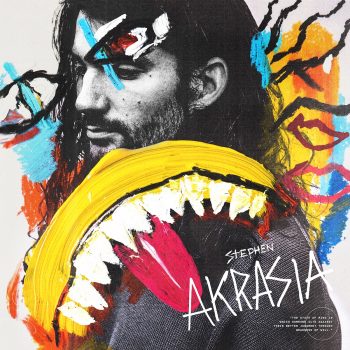
The song presents many of the deeper thematic elements of the album as a whole: The tension unfolds like a tragic play. Beginning with an overture of tender, melodic piano underscored by buzzing, fluttering synth oscillations, the song gently pulls back the curtain where Stephen’s vocal takes the stage. The lyric’s narrative finds our speaker sawing his own chest open and exposing a raw honesty, “Something about us don’t seem to make sense. Darling its cold out.” He punctuates the sentiment with the sincere if somewhat self-abasing refrain, “I never stay in love.”
A car door slams. The main synth riff swells. The lyrics are fraught with conflict as the speaker wrestles to maintain identity while being tempted to indulge a desire for oblivion.
“I wanna hold you closely.
I wanna lose myself in you. I wanna make you feel so good
But I don’t need you. No I don’t need you.”
The beat drop provides a sense of release while ushering in a driving intensity present throughout the record. The textured sounds illustrate a scene of a nighttime drive, open windows, wet roads glistening with neon lights. The driver’s face wears a cool smile as he drives out of frame. The intensity isn’t rooted in aggression or anger, but confidence and genuine freedom, calling the listener to enter in.
These themes of internal conflict, of navigating both the pleasure and destruction of living iwith no limitations thread the record together in its entirety. The record spawned from a season of metamorphosis – of experience a very real trial by fire and emerging on the other side with more wisdom, clarity, and most of all gratitude. Sonically, the album captures the internal struggle of humanity – the age-old conflict of id versus superego, ultimately resolving in a sense of gratitude for the fruit that struggle can ultimately produce.
Stephen’s singles “I Never Stay in Love,” “TRACER,” “Stray Nights,” and “Delilah” are available now. The full-length LP Akrasia is set for release on August 21.
— —
:: stream/purchase Akrasia here ::
A CONVERSATION WITH STEPHEN

Atwood Magazine: Before we dive into the album itself, I’d love to explore some of the events that led up to the new music. It’s 2016, you’re debut album Sincerely is starting to pick up momentum, when suddenly you’re forced to halt everything. What caused you to have to take a break and how did that season feel for you?
Stephen: Oh man, what a crazy time! Although I guess I could say that about every season.
Externally, my dreams were coming true. I spent two years writing this album, dropping out of college, and really taking a chance on a vision that I had, and it was coming to fruition. I was putting songs out. People were loving them. I was starting to tour. I was playing music festivals.
I decided to leave LA and go to Joshua tree to start working on my second album. I wanted to go into isolation, which was something I was always scared of – spending time alone.
So, on one side it was perfect. I was pushing myself. I was creating. I was inspired. But then there was this other thing happening that I had no control of, which was my health. It took a while to find out even what was going on. I was having symptoms for six, seven, eight months, before I even got a diagnosis of Lyme.
I ended up being pretty dysfunctional because of it. It just kind of put a halt to all of that. I had to go home, get better, recharge and rest. And seek treatment. It was rough.
Were you able to pursue any creativity in that season, or were you focused solely on health?
Stephen: There wasn’t necessarily creativity but definitely a lot of processing happening. I think I still am reflecting back on that time and trying to make sense of what it all did for me and what it all means to me.
The creativity started happening towards the end when I started getting better. For me was it was a time to slow down. Actually it was a huge growing pain for me because I recognized how much of my reality is out of my control. I can work hard and I can create music. I can push myself and stay up late and make things perfect. I can control that.
But at the end of the day, lI can’t control if I get bit by a tik and get Lyme disease. I think there was a time of processing how much is out of my control. And it was a time of gratitude. I think up until that point I kind of felt like everything that was happening in my life was because of me and my choices.
It allowed me to slow down and be grateful for like, damn! There’s so much that I didn’t choose that has been a blessing in my life. I think I started realizing that when my health started coming back, I was just so happy to be healthy. It was a starting point of happiness.
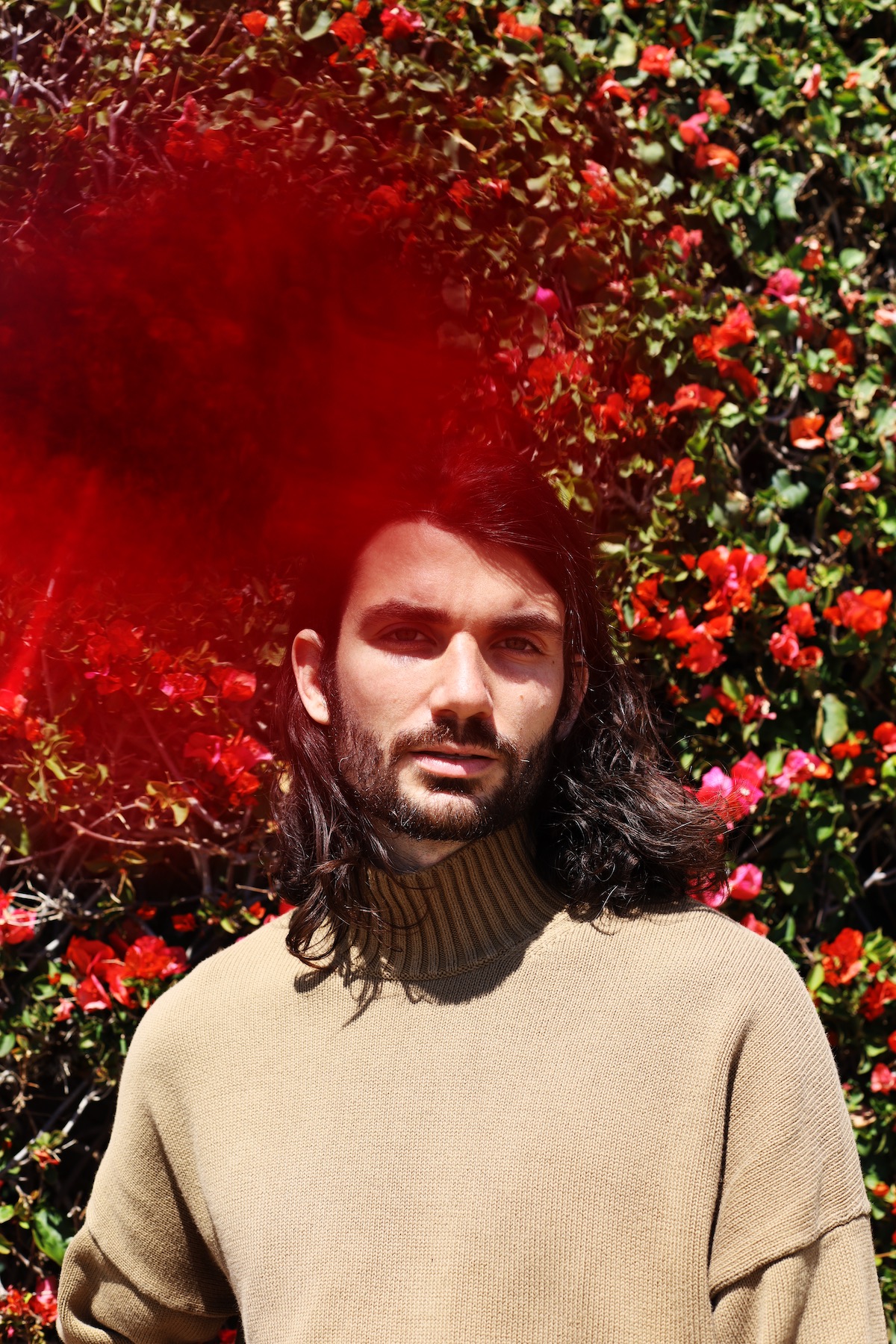
We take our health so for granted, until it’s gone. Like, I don't think about my knees until they start hurting. You know what I mean?
Stephen: That’s the world we live in now. It’s like all of the most important shit we take for granted.
If you didn’t have any of your basic needs, none of your worries and your external existential crises would matter. It’s the most fundamental things we are taking care of, most of us. I mean that’s our bread and butter man
And then when something happens to shake that, it’s eye opening.
Stephen: You realize how fragile it is. It really is. We’re seeing it now with Corona too. Society and everything. It’s very fragile.
Absolutely. So when you recovered, you ended up taking a trip to Thailand?
Stephen: Yeah, I mean, that was much later, but yeah, it would have been about a year ago.
What motivated that trip? Was there something you where trying to move closer toward or farther away from? Maybe a bit of both? Or something else entirely?
Stephen: A little bit of both. A little bit of both. Yeah. I had just finished an EP and I put it out. I think I was craving some disconnect from Los Angeles and the music industry. I’m very much an explorer and an adventurer, and I haven’t done a ton of world traveling. So that was a real icebreaker for me. It’s one of my favorite times of life, I think.
What did you discover when you were there? Did you have a trajectory of something you were looking for or was it a need to get away and explore and let things emerge organically?
Stephen: I think something that changed after being sick for me was how much I’ve reflected on the past and the future. Before I had gotten sick, I was always thinking and crafting the future. I was always reflecting on the past and how to make things better. Things were relatively planned out. I think after getting sick, my life was very much more based in the present moment and just experiencing what is happening now.
Things weren’t as planned out during that time of like going to Thailand. I wasn’t thinking too much about why I was doing the things I was doing. I was sort of just acting out of like, “Oh, that sounds fun. Let’s go there. Let’s do this.”
It was really liberating for me to be able to explore that part of life – of just being spontaneous. What was cool about Thailand was experiencing a total detachment from music. Music accompanies me pretty much every day. I’m always thinking about it. I’m always listening to if I’m not making it. To be in a place so far away where nobody knew what I did. I didn’t have to talk about music. None of my sense of self-worth was tied to my art. I got to kind of just be a human being.
I was also with my brother who I love more than anyone and two best friends from my childhood. So it was just sort of this alternative reality. I guess maybe I was searching. I don’t know.I was searching for, for a lot of things. I think I was searching for some presence – some joy in being here. You know? Like let’s just have fun and meet people and connect with others. I’ve met so many travelers from other, other parts of the world. That was my favorite part – connecting with people who didn’t live in Los Angeles.
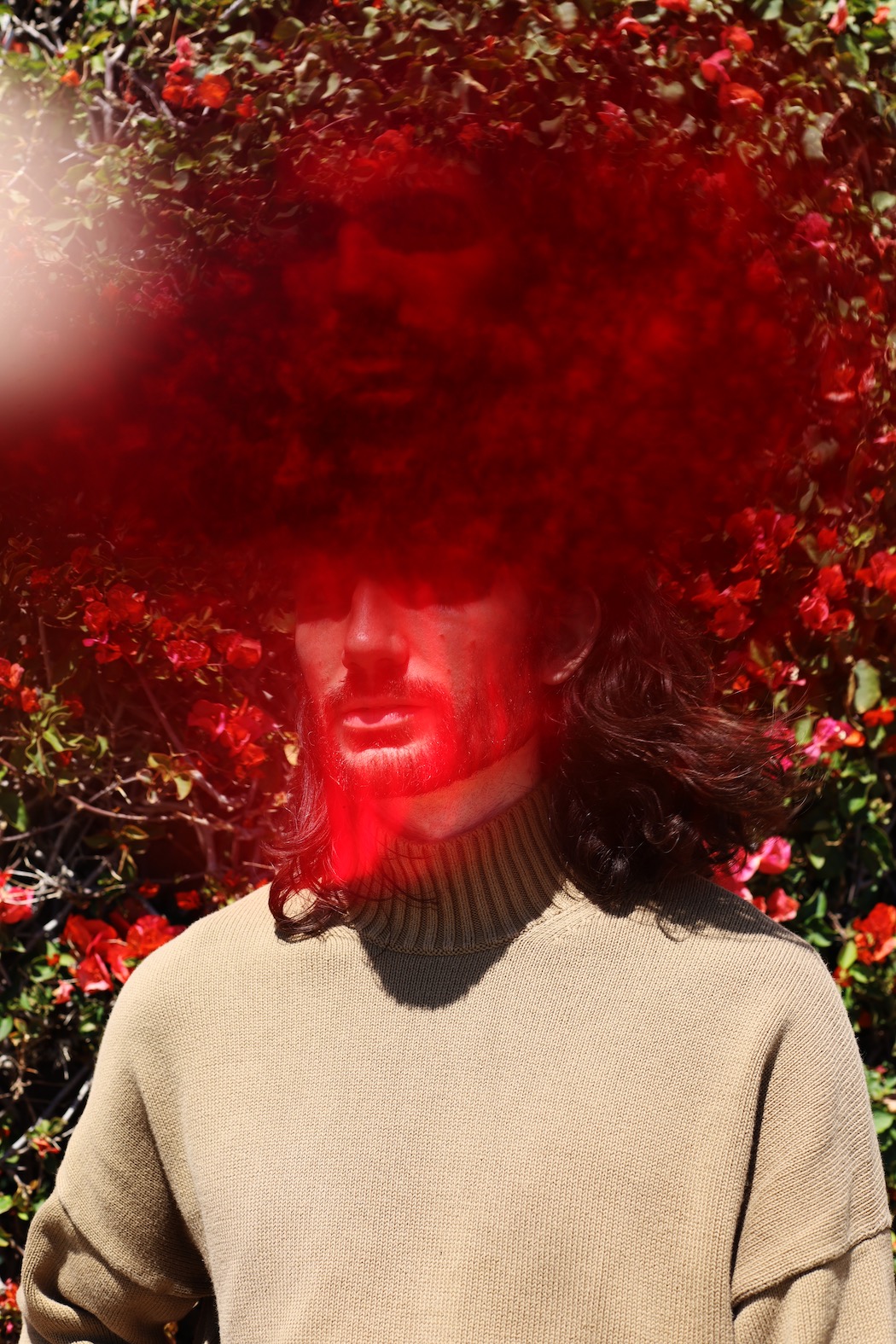
So it was the allure of traveling and adopting anonymity? Rolling into a new place where there’s no preconceived notion?
Stephen: It’s a rare opportunity because nobody knows you. It’s sort of like when you go to college for the first time and nobody knows you. You’re no longer held to the standards of people’s expectations of you. So you kind of get to shine the way you want to shine.
You’re like, “Okay, this is how I want to be. This is actually how I want to be, so let’s try this out!”
And nobody knows you any other way. I got to be my most curious, excited, childlike, calm self.
So you have just the one brother?
Stephen: I got one brother. Yeah. His name is Zach.
Nice. Older. Younger.
Stephen: Younger. I’m almost two years older.
With all that in mind, let's get into some of the new music. The title is Akrasia, which means to act against one’s better judgment due to weakness of will. I would love if you could just explain a bit about what that concept means to you and how it plays into the new record.
Stephen: It’s everything that kind of started and inspired this whole journey. It’s the theme throughout the entire record. For me, it was this last year after getting back from Thailand and moving back to LA. I found myself constantly reaching for things that would pull me back into this place just being in a fairytale. Thailand felt like a fantasy to me. It almost didn’t feel like real life.
And coming back to LA, although I was incredibly grateful for getting to make art again and to make music, I think I was craving this escape. I was really stressed out. There was a lot of pressure on me. I was working with a new team.
Sincerely was becoming more and more of a distant memory. I found myself more than ever being challenged by immediate gratifications. Something as simple as sleeping in or playing too many video games, even toxic escape relationships or doing drugs and escaping into oblivion by myself. It was like I was just craving a feeling of excitement and calmness through things that were instantly gratifying and destructive.
It was this whole journey for me. How do you deal with those forces? How do you deal with all of your being wanting to do something, but you know that the best thing for you to do isn’t that, it’s something else? It’s delaying that gratification and working towards working towards a bigger goal. So, every song on the album speaks on that topic in different ways.
In what ways did the events of the past two years and these new insights impact your approach to this record compared to your earlier work in terms of writing and producing?
Stephen: When I finished my first record, I remember thinking, “How the fuck am I going to do this again?” It was a lot of energy exerted, a lot of second guessing, a lot of overthinking, and I was scared at the thought of having to do that again.
But what happened for me was a combination of things. First of all, I’ve gotten a lot better at what I do and things are a lot easier for me now because I have more experience. When I was writing Sincerely, it was very early on in terms of how much experience I had even writing songs in the first place, singing and producing over my voice and things like that. So it required that extra effort. Spending a week on one little piece.
This time around things just happen so much faster. I trusted my instincts so much more. It was way less of an overthinking. Most of the songs on the album were 70, 80% done in like 24 hours. It all came out in an initial burst and the whole experience was just way more playful and effortless.
It also comes from the intention of what I was creating. When I was creating Sincerely, it was like an incredibly solemn and reflective and intense time, whereas this album is more of a collage. I feel like an adult in the sandbox. The whole thing is like very playful and collagey and it doesn’t take itself too seriously. But at the same time, it’s also really deep and really intense and has dark parts to it.
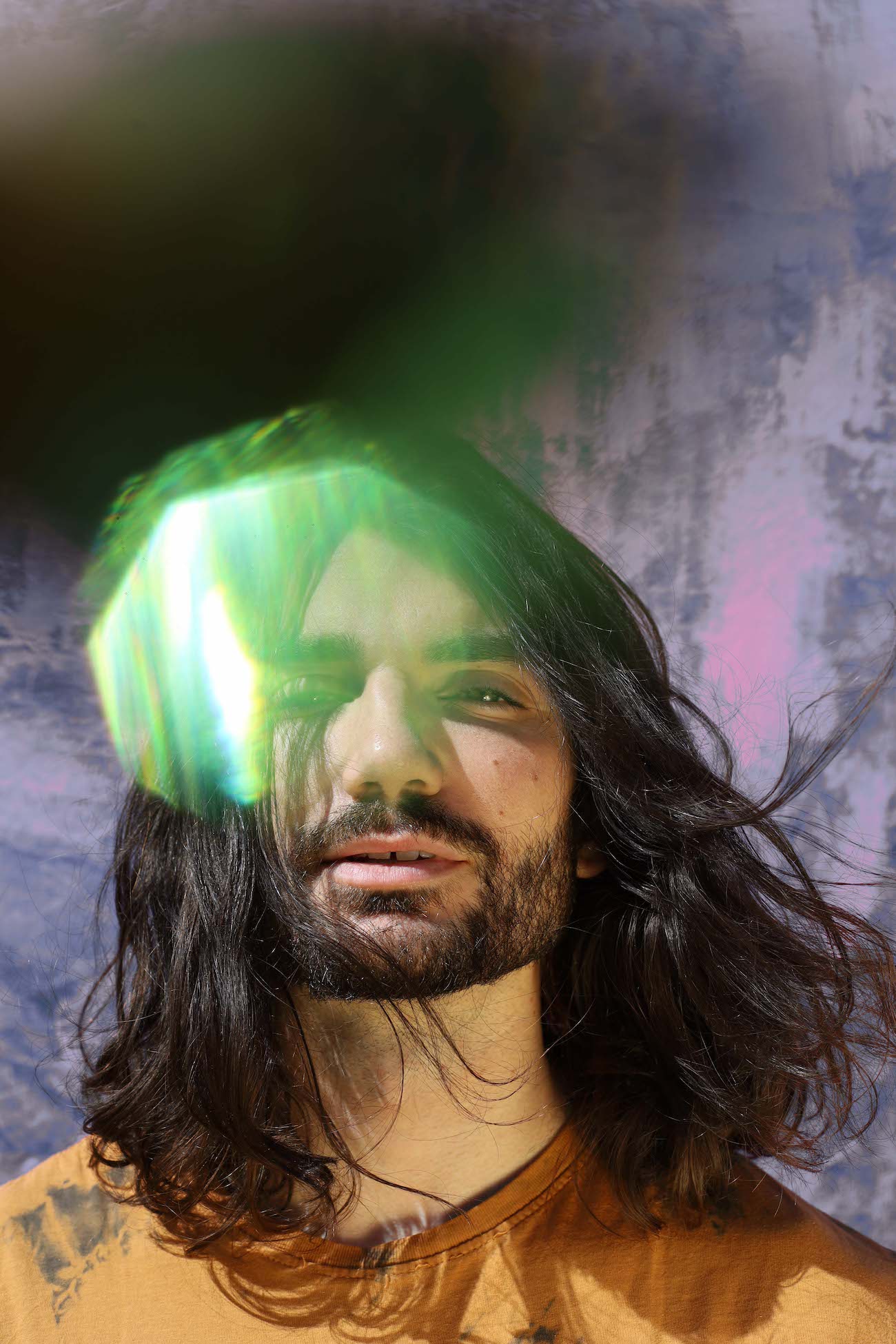
The album itself seems to have these really broad emotional sweeps. The synth sounds are a little bit more distorted and the beats are a little bit heavier. There’s a very real intensity that gets balanced out by these really sweet, tender songs. What were those emotions rooted in and were those broad, emotional sweeps intentional?
Stephen: Intentional, I don’t know. My creative process is always pretty chaotic at first. I don’t know how much of this was intentional. I think the intent gets discovered after the fact. It really is like a turning off of the mind, like, “Let’s get out of the way and let’s see what comes.” Then after the fact, you get to reflect and see what you resonate with.
The contrast of the sweetness and the intensity is… I haven’t thought about it, haha. I think it’s probably a reflection of the opposing feelings I’ve felt this last year, creating this album. Incredible highs and really scary lows, and an overall thankfulness for all of it. The ups and the downs and the intensity at which I can feel them and feel comfortable going there.
It almost feels like the metaphor that tree’s roots are as tall or as long as it’s trunk or whatever. I don’t know how true that is in terms of the human emotional capacity, but I do sort of wonder – is our ability to experience love and sweetness and presence a reflection of our ability to experienced pain and suffering and understand that and empathize. I don’t know.
One of the tracks that really illustrates that contrast is the song “Delilah,” which starts off really tender and then erupts in the chorus.
Stephen: That’s gotta be one of my favorite records. That song particularly is describing my shadow, my other half. My repressed persona, the parts of myself I have denied and didn’t realize I was capable of. That’s a direct example of the sort of yin and yang of our being.
Can you explore a bit deeper how you've sort of personified that notion of the duality within all of us, you know? How that characterization came about and how that presents in the song?
Stephen: This other part of myself that I’m calling “Delilah” and I named her girl because I’m a guy and I feel like my counterpart has as a female energy.
She is sort of the physical embodiment of my akrasia, reaching for sweetness, reaching for something to sink my teeth into. She’s all these repressed parts of myself that I didn’t know about. And in that song, it’s like…
(singing) “In the nighttime she shows us. She pulls us into the abyss, and I see myself closer.”
It’s sort of like in the nighttime when I’m smoking weed and things are getting different and everyone’s falling asleep, I realized there was this other part of myself wanting to come out. This whole song was me getting to know her and spend time with her. But that song really comes down to the lyric “How can life be so mean and so free?” Is that it? I should really know my lyrics better! Ha ha!
I should know your lyrics. But if you don't know them I feel better about it.
Stephen: Ha ha, Right?! So, yeah. How can life be so mean and so free? I can do anything that I want. I have the freedom to make any choice that I want. That’s the freeness. But the meanness is the capacity and the amount of choices I can make that are self-destructive and self-annihilating and counterproductive and harmful.
So that’s the dilemmas. Delilah is this character that comes out in me that wants self-annihilation. She just wants madness. She wants no order. She wants to get high. She wants to just not know what’s coming next or what’s come before her.
She’s this super free-spirited part of myself.
So then in terms of this idea of akrasia – lacking willpower to do what’s in your own best interest – is it better to lean into Delilah, or is it better to resist her? Or does it depend on the day?
Stephen: That’s a really great question! What it all comes down to is, so, okay … This is, and this is where it gets kind of like divine for me or almost occult. In hindsight it was my lack of willpower that brought me to this place to meet this person and to get to know this side of myself. And it’s almost like … it feels like… how would I explain it?
In hindsight, I’m grateful that I made those mistakes. I’m happy that I gave into my instant gratifications and I had the lack of willpower because I followed the sugar trail that took me to some dark places, but allowed me to come to terms with part of myself that I didn’t know about. It was my openness to experiment and to try things and willingly make mistakes.
The divine part of it is that there are forces in our life that we don’t understand, that guide us through our desires and the things that we want. I was very much for the first time in my life, stopping to overthink everything and be meticulous and intentional and just ask “What do I want right now?”
What happens if I just do exactly what I want all the time? How far can I go with that? I think there’s some power in doing just what you want. But for me, it definitely has a dead end that is incredibly dark and not healthy or productive. But to understand that that’s in you is a valuable lesson.
Then what also happens, which I think is a big theme in this album, is once you understand your capacity for self-destruction or for being an idiot and making mistakes or being a bad person, then when you are good, you are careful. It means that much more to you because you’re willingly making the choice as opposed to only knowing how to be good and only knowing how to do good. It’s sort of like your goodness doesn’t have an edge that way.
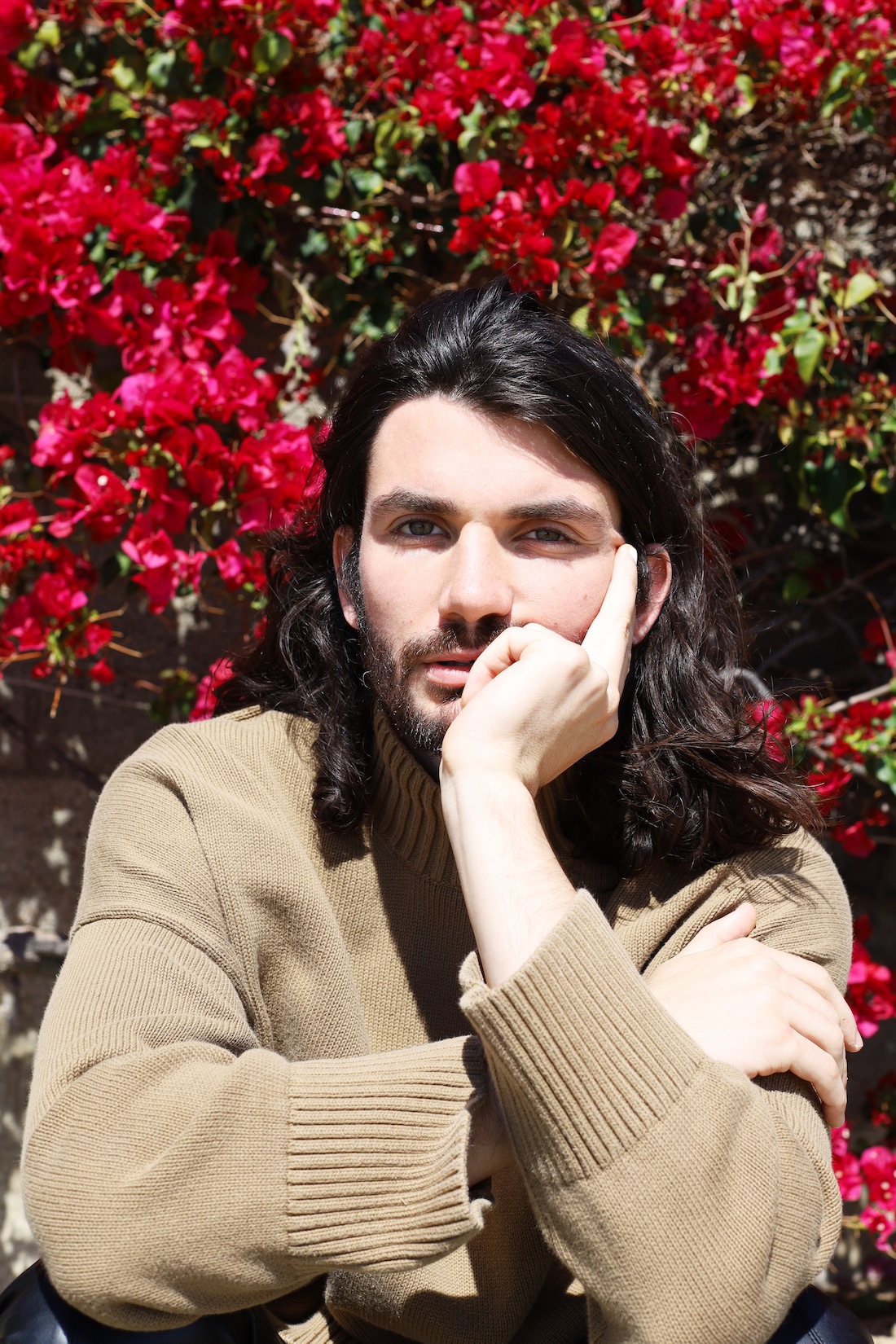
So there's a song on this album that features Chloe Angelides. What was it like to collaborate with her, and are there any other collaborations on this record?
Stephen: There’s actually no other collaborations so far. She’s the only true collab on it. Chloe is somebody that I’ve known since I was in high school. We were actually in a band together in Northern Virginia. I was her drummer. I don’t think we ever played a show. I think we maybe recorded like two or three songs in like a bedroom studio somewhere. But we’ve been really, really close. We came to LA about the same time. We didn’t even know this was happening, but when I moved into my house, a month later, she moved in literally, like 10 houses down from me.So we’re just like Highland Park bros.
When I was working on “Stray Nights” I remember being like, this needs Chloe. And, yeah, we just laid it down it was so easy. The drop part of that song is sort of driven by her vocal. Just kind of like ooing and umming. I had that section without her vocal, and I was like, “Chloe, we really need something here.”
And she’s like, “Oh, like this.” And she’s just done. Literally the first thing she’d sing – I loved it. And then she starts harmonizing it and I’m just sitting there like… alright! Yes… just like that! She just nailed it.
So you've got a new single that came out today, right? What's it like putting a new song out both in the current season of social isolation and quarantine, but also as part of this bigger narrative of of self-discovery?
Stephen: It feels great. It feels like strangely appropriate. Yeah. Um, I think it’s cool cause I think a lot of my music you can experience on a superficial level and just kind of move through it. But it also goes deep. I think maybe because of all the time that we all have, maybe people will dive into to some of it and internalize it more. I don’t even really know the setting that my music best is listened to. I’m always kind of torn. Is it music that I want people to put on their headphones at night and lay in their bed and kind of like zone out too? Is it like, “Shit, I want to like jam out to at a show and just rock out?” Is best listened to with friends in the car?
I think it’s all the above. I definitely can’t wait for people to get to experience it in group settings, but I think it’s cool that people will get to hear it in isolation. I’m kind of happy about that, I think.
The world is in a bizarre place right now where we’re trying to discern, collectively and individually, what is and is not in our best interest. We’re having to practice restraint. How would you describe your process, your experience, during this season of isolation and social distancing? As others who are in isolation or possibly just coming out of isolation here your music, what message do you hope they receive?
Stephen: Well, I think if I could put it fully in words, I wouldn’t have made any of the album in the first place.
I think that there’s definitely a lot that people will interpret and I want them to interpret and get their own take on.
The first couple of things that come to my mind. First of all, I want people to feel a sense of shameless and courageous exploration. Not being afraid to try things, to go outside of your comfort zone, to make mistakes, to scare yourself, to let people down. I want people to feel liberated from that box.
I want people to know that just because you’re dealing with difficult times or you’re having problems, it doesn’t mean that you’re in a bad place or that you’re going the wrong way. I think a lot of the times we have to go through growing pains to get to the other side, and I want to encourage people to keep pushing and keep going.
I also think I want people to get a sense that happiness and fulfillment is hard work. It’s not something that we should feel an expectation to have without trying very hard. It’s not something that’s just given to us. When we’re kids, we have this naive sense of happiness and excitement in general
But there’s so many snakes both in the world outside of us and within ourselves. It’s a daily commitment to like make this experience worthwhile. It’s easy. For me, I’m grateful for facing the things that I face. Some of which almost felt like the beginnings of what could be like an addiction or something.
Because the way that you face those problems is every single day you take it day by day and you make the commitment to do what’s best. I’m thankful for having gone to that extreme to know now I have to really be careful and I have to make every single day count and I have to make every day matter.
So it’s a gratitude for my struggles. It’s a commitment to a clear mind and working hard to maintain that. I think more than anything, a huge message I want to portray in all my art moving forward for a very long time is a feeling of gratitude for just being alive that we even get today. To help people rediscover that childlike wonder that is accompanying us in every single moment, and to feel that passion for life and that excitement for the unknown. To slow down and realize that everything you want, you already have.
— —
:: stream/purchase Akrasia here ::
— —
Matt Gose loves stories, great songs, driving windows-down along the coastal highways of North County San Diego, and his incredible wife, Alexandra. In 2011, he graduated from Point Loma Nazarene University with a BA in Literature and currently works in San Diego County as a freelance writer and substitute teacher. When he’s not writing, he’s playing his guitar named sunny, reading, spending time outdoors, or otherwise on the lookout for adventure. His favorite author in Ken Kesey. His favorite song is “You Still Believe in Me,” by The Beach Boys. His favorite movie is Almost Famous (duh). And his favorite food is tacos de lengua. Catch him on Twitter @thegosewriter, Instagram @gosewriter, and on the web at www.gosewriter.com
— — — —

Connect to Stephen on
Facebook, Twitter, Instagram
Discover new music on Atwood Magazine
? © Undine Markus
:: Stream Stephen ::

